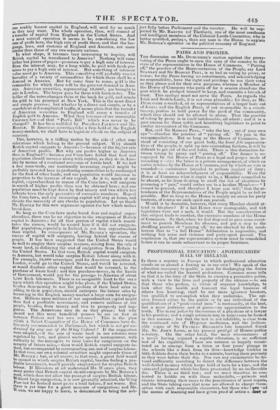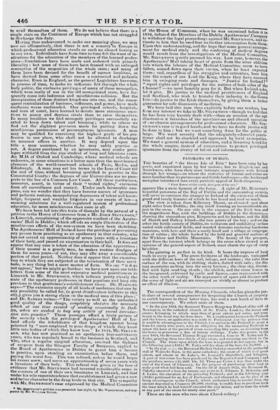PROFESSIONAL EDUCATION: APOTHECARIES' HALL OF IRELAND.
Is there a country in Europe in which professional education stands on so absurd a footing as in our own ? We speak of the education necessary to qualify a man for discharging the duties of what are called the learned professions. Common sense tells us that it is the duty of the State to exercise a proveutive police, with a view to the lives and property of the citizens — to see that those who profess, in virtue of superior knowledge, to look after the health and transact the legal business of others less knowing, shall be not mere ignorant boasters, but qualified to accomplish what they undertake. The opi- nion formed either by the public or by any individual of the qualifications of a "professional man " is necessarily, at. the best, but a more judicious sort of guess—au approximation to the truth. The many judge by the success of a physician or a lawyer in his practice; and a rough estimate may in some cases be formed in this manner; but that the test is not infallible, is clear trom the continued sale of Ilygeian medicines, and the fashion- able vogue of Sir Fa Boum:I-is late lamented friend Mr. ST. JOHN LONG, or his present prott!gii of Hotnusapathso notoriety. On the other hand, the mere circumstance of a man's having enjoyed a regular education, is no sufficient test of his capability. There are natures so happily consti- tuted as to emerge from a three or four years' plunge In the schools like a duck from its dive—knowledge trickles in little driblets down their backs in a minute, leaving them precisely as they were before their dip. Nor can any examination be de- vised sufficiently searching to detect the difference between the well-drilled memory which keeps hold of facts for a time, and the saturated judgment which has been penetrated by an ineffaceable die. There is no Bind test ; and we must thereline be con- tented to hobble on with these makeshifts,— patients and clients intrusting their cases to the practitioners of most repute, and the State taking care that none are allowed to charge them- selves with such responsible characters, but those who 1 ave 'lad the means of learning and have given proof of active e. dm. ur
to avail themselves of them. We do not believe that there is a single state on the Continent of Europe which has not struggled to discharge this duty.
Having thus endeavoured to make our meaning tlear, we may Tow say affirmatively, that there is not a country in Europe in which professional education stands on such an absurd footing as Iii our own. Individuals have from time to time felt the want of in- stitutions for the education of the members of the learned profes- sions—flomdations have been made and endowed with princely liberality : but none of them have been framed with an enlarged conception of the necessities of the whole state; and many of them have been devised for the benefit of narrow localities, or have derived from some other cause a contracted and pedantic character. Even in England, as the general Legislature has come, in process of time, to make its influence felt through the whole body politic, the exclusive priviteges of many of these monopolies, which were really of use in the old unorganized state, have fre- quently come into ludicrous and mischievous collision. But the incorporation of three distinct kingdoms into one, and the conse- quent centralization of business, influence, and power, hate made confusion worse confounded. Our privileged schools, hospitals, and inns of court, have learned to devote more strenuous exer- tions to annoy and depress rivets than to raise themselves. In many localities we find monopoly privileges successfully ex- erted to keep down talent and learning ; while in others we find not the slightest provision made for putting down the mischievous pretensions of presumptuous ignorance. A man may be qualified for exercising the highest grade of his pro- fession in one place, who shall not he allowed to discharge its meanest offices in another. It may depend upon the title a man assumes, whether be may safely practise or not. A degree purchased by an ignoramus, may confer privi- leges withheld from the ripe student of long and laborious scars. An M.D. of Oxford and Cambridge, where medical schools are unknown, in some situations is a better man than the most learned alumnus of the world-renowned schools of Paris, Berlin, and Edinburgh. A man may eat his terms in the Inns of Court till the end of time, without becoming qualified to practise in the Consistorial Courts: the degrees of our Universities are no pass- ports to the bar of a Common Law Court. All these institutions, moreover, assert, in virtue of their " vested rights,'' exclusion from all surveillance and control. Under such favourable aus- pices, can we wonder that they have become nurses of ignorance and pedantic routine, monopolizing depressors of talent and know- ledge, frequent and wealthy litigators in our courts of law—a seeming substitute for a well-regulated system of professional education, far more mischievous than none at all.
We have been led into this train of thought by the perusal of a petition to the House of Commons from a Mr. JOHN STE vENsoN,* in Limerick, complaining of the oppressive conduct of the Apothe- caries' Hall in Dublin; which affords an ample illustration of the mischievous effects of the non-system we have been sketching. The Apothecaries' Hall of Irelatal have the privilege of preventing any person from practising as an apothecary in that country, who has not served an apprenticeship of seven years with a licentiate of their body, and passed an examination in their hall. It does not appear that any care is taken of the education of the apprentices: if their master is a greedy man, he makes routine drudges of them for seven years—if not, they may idle away a considerable portion of that period. Neither does it appear that the examina- tion to which they are subjected at the termination of their servi- tude, is any thing but a mere matter of Com. We say "it it es not appear," but we might go further: we have now upon our table letters from some of the most extensive medical practitioners in Limerick to Mr. STEVENSON, which indicate pretty clearly the state. of the apothecary profession in that populous and busy city previous to that gentleman's establishment there. Dr. HARPING says—" The extensive supply of all kinds of medicines that can by any possibility be called for, (a great desideratum hitherto in this city,) gives you a strong claim on the medical men of this placer and Dr. SAYERS writes—" The variety as well as the undoubted
good quality of the drugs, completely obviates the necessity
which at one time existed ef sending occasionally to Dub- in:, when we wished to buy any article of recent introduc- tion into practice." These passages afford a lively picture of the security o hich the privileged Apothecaries' Hall of Ire-
land affords the inhabitants of that kingdom against being
poisoned by "men employed to pour drugs of which they know little into bodies of which they know less." In 1934, Mr. STEVEN- SON, who has now practised as an apothecary four-and-twenty
years, who was regularly bound to the business in Scotland, and who, after a regular surgical education, received the diploma
of surgeon from the Glasgow Faculty of Surgeons, applied to
the Board of Apothecaries in Dublin to grant him a licence to practice, upon standing an examination before them, and paying the usual fees. This was refused, unless he would begin
his career anew, and serve an apprenticeship of seven years with a licentiate of their body. This refusal was given in the face of evidence that Mr. STEVENSON had invested considerable sums in
the concern of one of their own licentiates in Limerick, and that under his sole superintendence that establishment had given a new
and better character to the drug trade in that city. The sympathy with Mr. STEVENSON'S ease expressed by- the Medical Committee • Mr.Sirretrsoa's petition sues yzesented hist night, by Mr. WARBURTON, EMI sup- porta' Z. WILLIAM RUCHE.. of the House of Commons, when he was examined before it in 1834, induced the Directors of the Dublin Apothecaries'gompany to withdraw the legal proceedings against Mr. STEV EN SO N, and in- timate to him that he need fear no further interruption from them. Upon this understanding, and the hope that some general arrange. ment for medical study and the conferring of medical degrees would result from the investigations of the Medical Committee, Mr. STEVENSON qoietly pursued his way. Last year, however, the Apothecaries' Hall taking heart of grace from the utter oblivion into which the labours of the Medical Committee seem to have fallen, soused down upon their victim, when he least expected them ; and, regardless of his struggles and entreaties, bore him into the courts of our Lord the King, where they have amerced him in swinging costs and damages. "Justice for Ireland!" " equal rights and privileges for the natives of both sides of the Channel !"—we most heartily pray for it. But when Ireland asks, let it give. Do justice to the medical practitioners of England and Scotland, who wish to transfer their industry to the Green Isle—do justice to the Irish themselves, by giving them a better guarantee for safe dispensers of medicine.
We have laid this case thus explicitly before our readers, less from any interest we take in Mr. STEVENSON—though we feel that he has been very harshly dealt with—than on account of the apt illustration it furnishes of the mischievous and absurd operation of our chaotic arrangements for professional education. Mr. Sm. vasisoses case is in good hands,and we have no doubt justice will be dune to him ; but we want something done for the public at large. We want security that the adequately-educated practi- tioner shall not be shackled and oppressed by local monopolies. We want a general system of education, and a licensing board for the whole empire, instead of corporations to protect privileged ignorance from the rivalry of talent and information.



























 Previous page
Previous page